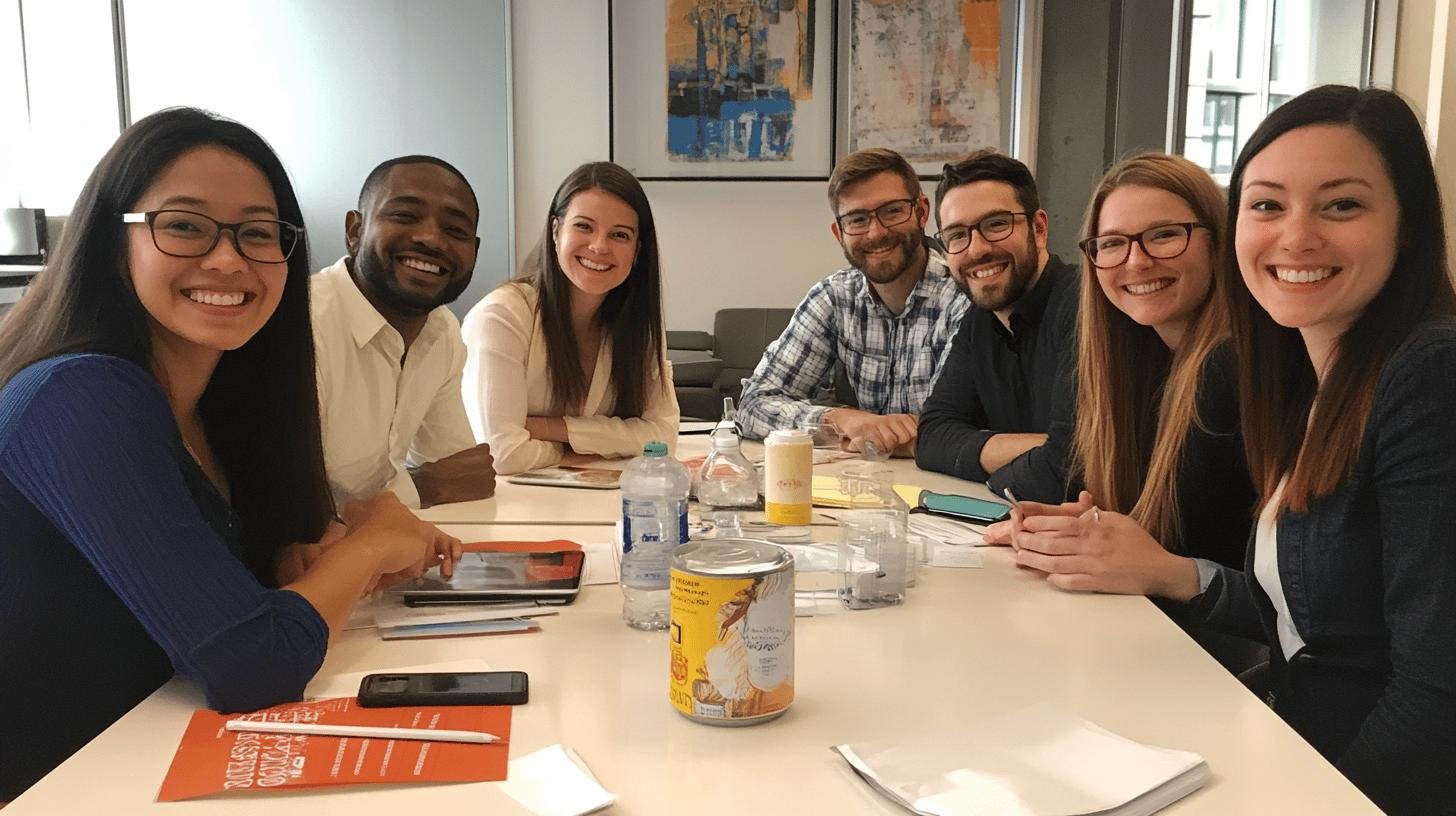TL;DR:
- Conformity bias stifles creativity and critical thinking in the workplace.
- Promoting respect over conformity enhances innovation and employee engagement.
- Strategies to build a respectful workplace include:
- Open communication
- Recognizing employee contributions
- Providing respectful feedback
- Implementing respect training
- Encouraging collaboration
- Modeling respectful leadership
- Diversity boosts innovation by fostering varied perspectives and problem-solving.
- Respect initiatives increase employee satisfaction through:
- Feedback culture
- Celebrating diversity
- Encouraging personal expression
- Acknowledging achievements
- Providing development opportunities
- Emphasizing individuality and autonomy enhances motivation, creativity, and growth.
Is your workplace stuck in a cycle of conformity that stifles creativity and innovation? Conformity bias can dampen individuality, leading to missed opportunities for growth and success. It’s time to flip the script and focus on fostering respect rather than forcing everyone into the same mold. Emphasizing workplace respect creates a culture where diverse perspectives shine, driving creativity and critical thinking. This shift not only enhances individual expression but also fuels a more inclusive and dynamic environment. Ready to see how respect can revolutionize your workspace? Let’s dive into its immense potential.
Encouraging Respect Over Conformity: A Workplace Imperative
Conformity bias in the workplace can be problematic. It often stifles creativity, curbs innovation, and limits critical thinking. When employees feel the need to conform, they may withhold unique ideas or perspectives, fearing they might not fit in. This suppression of individuality can hinder success, creating an environment where only some voices are valued.
Promoting respect instead of conformity can change this dynamic. In a respectful workplace, everyone’s contributions and perspectives are valued, creating a more inclusive and vibrant environment. Prioritizing respect encourages open dialogue and the sharing of diverse ideas. This approach broadens the range of solutions and fosters a sense of belonging among employees.
Non-conformity has its benefits. It fosters innovation by encouraging unique contributions. When employees feel free to express themselves, they are more likely to propose creative solutions and challenge conventional thinking. This openness can lead to breakthroughs that a conformist culture might miss.
In summary, shifting the focus from conformity to respect creates a workplace culture where diversity and individuality are celebrated. Encouraging respect over conformity not only enhances innovation but also builds a stronger, more engaged workforce.
Strategies to Build a Respectful Workplace Environment

How can workplaces encourage respect? By promoting open communication, recognizing achievements, and providing constructive feedback, they can nurture a culture where respect thrives. Such practices acknowledge individual contributions, reduce stress, and boost employee engagement.
Here are six strategies to build a respectful workplace:
1. Promote Open Communication
Encourage employees to speak up and share their thoughts without fear. Open communication fosters respect by allowing everyone to contribute.
2. Recognize Employee Contributions
Celebrate successes, no matter how small. Acknowledging efforts boosts morale and motivation.
3. Provide Respect-Based Feedback
When offering feedback, focus on growth. Respectful feedback helps employees improve while feeling valued.
4. Implement Respect Training Programs
Training sessions on respect can teach employees how to create a more respectful workplace.
5. Encourage Team Collaboration
When employees work together, they learn to appreciate different strengths. Collaboration fosters mutual respect.
6. Model Respectful Leadership
Leaders set the tone. When leaders demonstrate respect in their actions, employees are likely to follow suit.
The Role of Leadership in Encouraging Workplace Respect
How can leaders promote respect? By modeling respectful behavior. When leaders embody respect, they set a standard for all. This encourages a positive work environment where employees act similarly. Leaders who listen, acknowledge contributions, and treat everyone fairly cultivate mutual respect.
Respect is vital for leaders as it boosts employee health, focus, and engagement. Respected employees are more productive and satisfied, contributing to a healthier workplace. Leadership styles also influence respect. Authentic and ethical leaders effectively foster a respectful environment. Their honesty, transparency, and fairness build trust and respect.
Leaders embracing these qualities enhance respect and drive innovation. A respectful environment nurtures creativity and supports diverse idea-sharing, benefiting the entire organization.
Promoting Diversity to Enhance Workplace Innovation

How does diversity impact innovation? Embracing diversity encourages varied idea-sharing, boosting innovation. Valuing diverse perspectives creates an environment ripe for creativity and problem-solving. Diverse teams challenge conformity bias, often hindering innovation.
Why are diverse teams effective? They combine different backgrounds and viewpoints, enhancing creativity. This mix allows problems to be approached from multiple angles, offering unique solutions a homogeneous group might miss. Diversity not only adds variety but drives progress.
Respect through diversity improves workplace culture. Valuing each team member’s contributions creates a culture of learning and creativity. This respect empowers employees to share ideas without judgment, boosting morale and encouraging continuous improvement.
Diverse teams bring:
- Broader perspectives, leading to innovative ideas
- Improved problem-solving with varied viewpoints
- Creativity and openness by challenging conformity
- Encouragement for sharing and collaboration through respect
Promoting diversity leverages the full potential of teams to enhance innovation. By valuing differences, organizations create dynamic workplaces where creativity thrives, leading to better solutions and success.
Implementing Respect Initiatives for Employee Satisfaction
How can respect initiatives boost satisfaction? They create cultures where employees feel valued and heard, increasing satisfaction and loyalty. By listening and acknowledging achievements, organizations foster positive work environments.
Here are five respect initiatives that can improve satisfaction:
1. Promote a Feedback Culture
Make it a habit to ask for employee input. This shows that their opinions matter.
2. Celebrate Diversity
Acknowledge different backgrounds and celebrate them. This fosters a sense of belonging.
3. Encourage Individuality
Allow employees to express themselves. Personal expression leads to creativity and higher job satisfaction.
4. Recognize Achievements
Publicly praise accomplishments to motivate employees to keep striving for excellence.
5. Provide Development Opportunities
Invest in training and growth for your employees. This shows that you value their future with the company.
The Benefits of Encouraging Individuality in the Workplace

How does individuality impact motivation? Embracing individuality boosts motivation by allowing expression of unique talents and perspectives. Accepted employees feel valued, increasing motivation and engagement. It reduces the pressure to conform, enabling full self-expression.
Individuality is key to creativity. Encouraging out-of-the-box thinking fosters innovative solutions. Valuing individuality transforms workplaces into breeding grounds for fresh ideas, driving organizations forward.
Autonomy contributes to growth. It empowers initiative and decision-making, fostering personal growth. Learning from experiences leads to higher job satisfaction and confidence. This empowerment enhances performance and cultivates a proactive culture.
Autonomy supports innovation. It allows employees to explore and experiment, encouraging creative risks. This freedom nurtures a culture where innovation thrives, with employees pursuing new ideas without fear of failure. Encouraging individuality and autonomy creates dynamic workplaces where personal and organizational growth are prioritized.
Final Words
Shifting the focus from conformity to respect builds a better workplace where diversity and individuality thrive. This not only fosters more innovative solutions but also promotes employee loyalty and satisfaction. Encouraging respect over conformity enhances creativity and motivates leaders to inspire their teams. Diverse teams bring unique perspectives that boost innovation, while respect initiatives improve overall job satisfaction.
By embracing individuality and respecting diverse opinions, workplaces can become hubs of creativity and progress, allowing teams to flourish in a dynamic and inclusive environment.
FAQ
How can I encourage respect in my workplace?
Promote open communication, recognize achievements, and provide respectful feedback. Respect training can also help.
What does it mean to promote respect over conformity?
It means valuing diversity and individuality instead of forcing employees to fit a certain mold.
Why is conformity bad in the workplace?
Conformity stifles creativity and innovation by discouraging employees from sharing unique ideas.
How can leaders promote respect?
Leaders can promote respect by listening, acknowledging contributions, and treating everyone fairly.
How do you foster creativity through respect in the workplace?
Respect encourages employees to share unique ideas without fear of judgment, leading to increased creativity and innovation.

